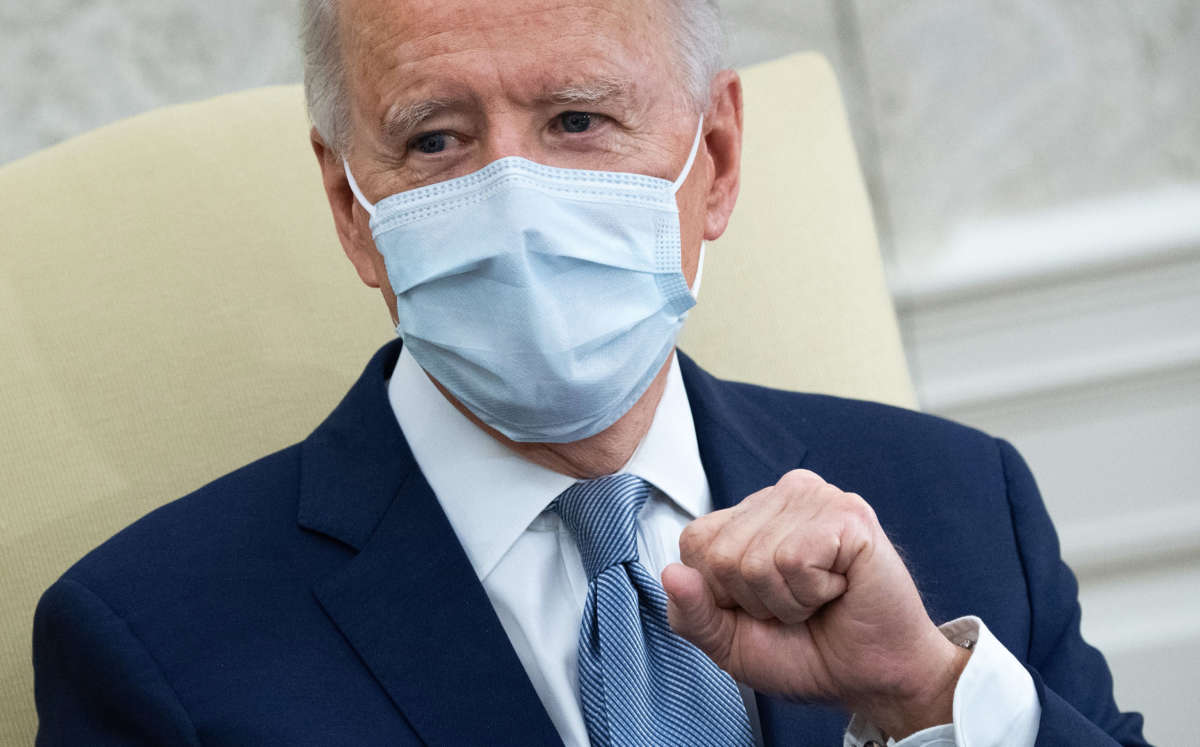Two separate polls conducted recently show that the majority of the American public is in favor of passing a COVID-19 stimulus bill quickly and that they are largely supportive of Joe Biden’s version of the bill. With Congress poised to pass Biden’s stimulus through reconciliation soon, the polls show that bipartisan agreement among the public shows that such drastic cuts as Republicans have proposed are not necessary.
One poll conducted by Yahoo News/YouGov at the end of January shows that, of the 20 policies that define Biden’s $1.9 trillion stimulus proposal, all have majority support among those polled, with at least 60 percent in favor of nearly half of the policies. The most popular proposals are $2,000 in stimulus checks (though the stimulus plan currently only includes $1,400 in relief checks) and funding for vaccines, which have 74 and 69 percent of support, respectively.
Even the $15 minimum wage proposal in the bill that so many Republicans vehemently oppose is favored by most of the 1,516 adults polled, corroborating what many other polls have found in the past.
Another poll, conducted by Vox and Data for Progress also at the end of January, shows that a majority of likely voters from both parties think that the relief bill should come “as soon as possible,” with 63 percent in favor. Sixty-four percent say that they would support passing a bill with 51 votes instead of the 60 required by the filibuster rather than focusing on bipartisanship, and 66 percent say that they would support changing the rules in the Senate so that the bill can be passed as soon as possible.
Though Republicans unveiled a bill on Sunday that cuts Biden’s proposal by over two-thirds, these polls show that those cuts aren’t necessary to win over the public because public opinion is strongly in favor of Biden’s stimulus bill. On Tuesday, highlighting the Yahoo/YouGov poll, Biden’s chief of staff Ron Klain tweeted about Biden’s stimulus: “This IS a bipartisan agenda.”
On Monday, Biden met with 10 Republican senators who proposed paring down the bill to $600 billion. The meeting was an effort at bipartisanship by both parties. But, as Politico reports, with the memory of being scarred from down-ballot losses and backlash against the Barack Obama presidency when Democrats largely gave in to Republican stonewalling, Biden is not interested in making major concessions. The meeting did not change the size of the stimulus plan.
This week, Democrats are making preparations to pass Biden’s stimulus package via budget reconciliation, which will allow the Senate to pass the bill with a simple majority. House Speaker Nancy Pelosi and Senate Majority Leader Chuck Schumer filed a joint budget resolution on Monday that will serve as the vehicle to pass the bill. Many top Democrats, including Biden himself, are in favor of using reconciliation for the stimulus.
In recent days, Republicans have balked at the Democrats’ attempt to use reconciliation to pass the bill, calling it divisive even though Republicans used reconciliation in 2017 to pass Donald Trump’s tax bill. The new polls show that the effort has bipartisan support among the public, but one GOP senator told HuffPost that passing the bill via reconciliation “would be like declaring war around here.”
Some Republicans, freshly worried about the deficit, complain that the bill is too big and would help the wrong people. Many specifically take issue with the popular Democratic proposal to raise the minimum wage to $15 an hour.
But two new reports — one by an economics professor at University of California, Berkeley, and another by the Economic Policy Institute — show that the minimum wage raise would save the federal government between $77 and $95 billion a year with the increase in revenue from payroll taxes and decrease in spending on welfare programs like food stamps to supplement low wages.
Join us in defending the truth before it’s too late
The future of independent journalism is uncertain, and the consequences of losing it are too grave to ignore. To ensure Truthout remains safe, strong, and free, we need to raise $43,000 in the next 6 days. Every dollar raised goes directly toward the costs of producing news you can trust.
Please give what you can — because by supporting us with a tax-deductible donation, you’re not just preserving a source of news, you’re helping to safeguard what’s left of our democracy.
